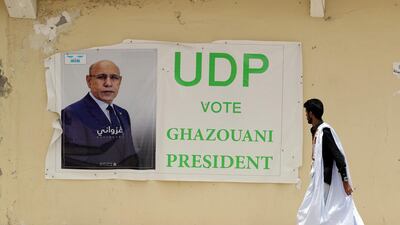Mauritanians will vote for a new president on Saturday in what is expected to be the West African country's first peaceful transfer of power since independence from France in 1960.
President Mohammed Ould Abdel Aziz will step down after serving two five-year terms since he took power in a coup in 2008, resisting a trend in which post-colonial African leaders have sought to extend their rule beyond constitutional limits.
Togo and Chad have in the past two years capped their presidential mandates to two five-year terms - but those laws will not be applied retroactively, allowing the current presidents to stay in power potentially for over 10 years more.
Abdel Aziz, an ally of Western powers in the fight against Islamists in the Sahel region, leaves behind an economy that has picked up since 2017 after a drop in the price of iron ore dented export profits.
The International Monetary Fund expects growth of nearly 6% this year, up from 3.5% in 2018. The economy will receive a boost when a large offshore gas field starts producing early next decade.
But the six presidential candidates, including a prominent anti-slavery campaigner and a former prime minister, face widespread discontent among young people who see few prospects in the vast, thinly populated desert country where less than 1% of the land is arable, corruption is rife and salaries have stagnated.
"We the people are suffering, we are being wronged, there is no work, people employ you for a miserable salary," said one man at a market in the capital Nouakchott. "Then tax collectors take what they have to take from that miserable salary."
Mauritania, which straddles black and Arab Africa, was the last state in the world to outlaw slavery in 1981. But 2% of its people still live as slaves, according to the 2018 Global Slavery Index.
Rights groups say dissent against Abdel Aziz was forcibly put down by government troops, including protests calling for an end to the country's persistent slave trade.
"Young people have had enough," said one young potential voter who asked not to be named. "All the government opponents such as artists who denounced the state, they all left, they all escaped because there is no equal rights."
Mauritania ranked 159th out of 189 in the latest United Nations' Human Development Index.
Saturday's candidates include former prime minister Sidi Mohamed Ould Boubacar, ruling party candidate Mohamed Ahmed Oudl Ghazouani and anti-slavery campaigner Biram Dah Abeid, Abdel Aziz's closest rival in 2014.

